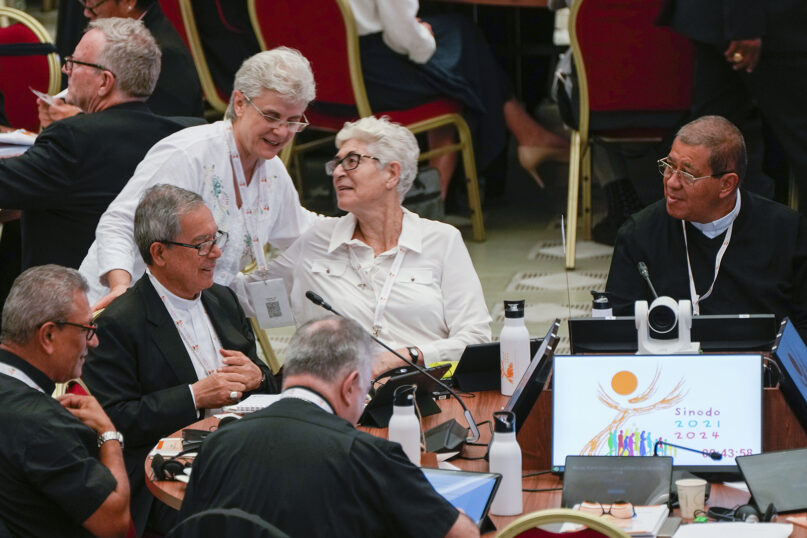VATICAN CITY (RNS) — In a letter addressed “to the people of God,” participants of the Vatican’s Synod on Synodality, a monthlong summit discussing the Catholic Church’s most pressing issues, insisted their gathering was “not about ideology” but about listening to differing points of view.
The letter, issued on Wednesday (Oct. 25), four days before the summit ends, praised the trust that has been built during the synod, which allowed participants to have “the audacity and inner freedom that we experienced, not hesitating to freely and humbly express our convergences, differences, desires and questions.”
The Synod on Synodality is a gathering of Catholic bishops, clergy, religious and laypeople to address questions facing the church, from LGBTQ acceptance to women’s ordination to accountability for clerical abuse cover-up. The summit, which started on Oct. 4 and will end on Sunday, follows two years of consultations with faithful in parishes and bishops’ continental assemblies.
While the conversations within the synod have tackled some of the most divisive issues within the church, the letter avoids making any direct reference to polarizing topics. “This is not about ideology, but about an experience rooted in the apostolic tradition,” the letter read.
The synod will publish a synthesis of its discussions on Saturday, which will become the basis for the next synod meeting, scheduled for fall 2024. The letter said the document will illustrate the questions synod attendees agreed on, while the “multiple challenges and numerous questions” that arose will need further discussion.
After the letter was read to the synodal assembly on Wednesday morning, the small working groups where participants have carried out their debates this month sent changes and suggestions back to the writers at the Vatican’s General Secretariat of the Synod. Participants voted on the final document in the evening.
The document stressed that “the church absolutely needs to listen to everyone, starting with the poorest” and “those who have no right to speak in society or who feel excluded, even by the church.” The document specified that this includes eliminating all forms of racism in the church and listening to clerical abuse victims to create effective prevention structures.
Participants wrote that the summit has been an “unprecedented experience,” where Catholics were invited to speak freely on difficult issues. Participants said they join with Pope Francis in underlining the importance of caring for the environment and the protection of immigrants, which have been at the heart of prayerful ceremonies at the synod.
The church must listen to the laity, and especially to the demands and needs of families, the letter stated, reflecting a synod distinguished by its openness to laypeople, including 54 women with full voting rights.
“Our assembly took place in the context of a world in crisis, whose wounds and scandalous inequalities resonated painfully in our hearts, infusing our work with a particular gravity, especially since some of us come from countries where war rages,” it read.
Attendants from Syria, Lebanon, Israel and Iran were within the synod hall when Hamas militants attacked Israel. And the synod discussions continued through Israel’s forceful retaliation in Gaza and the debates that followed.
“We assured our solidarity and commitment alongside the women and men all over the world who are working to build justice and peace,” the letter read.





